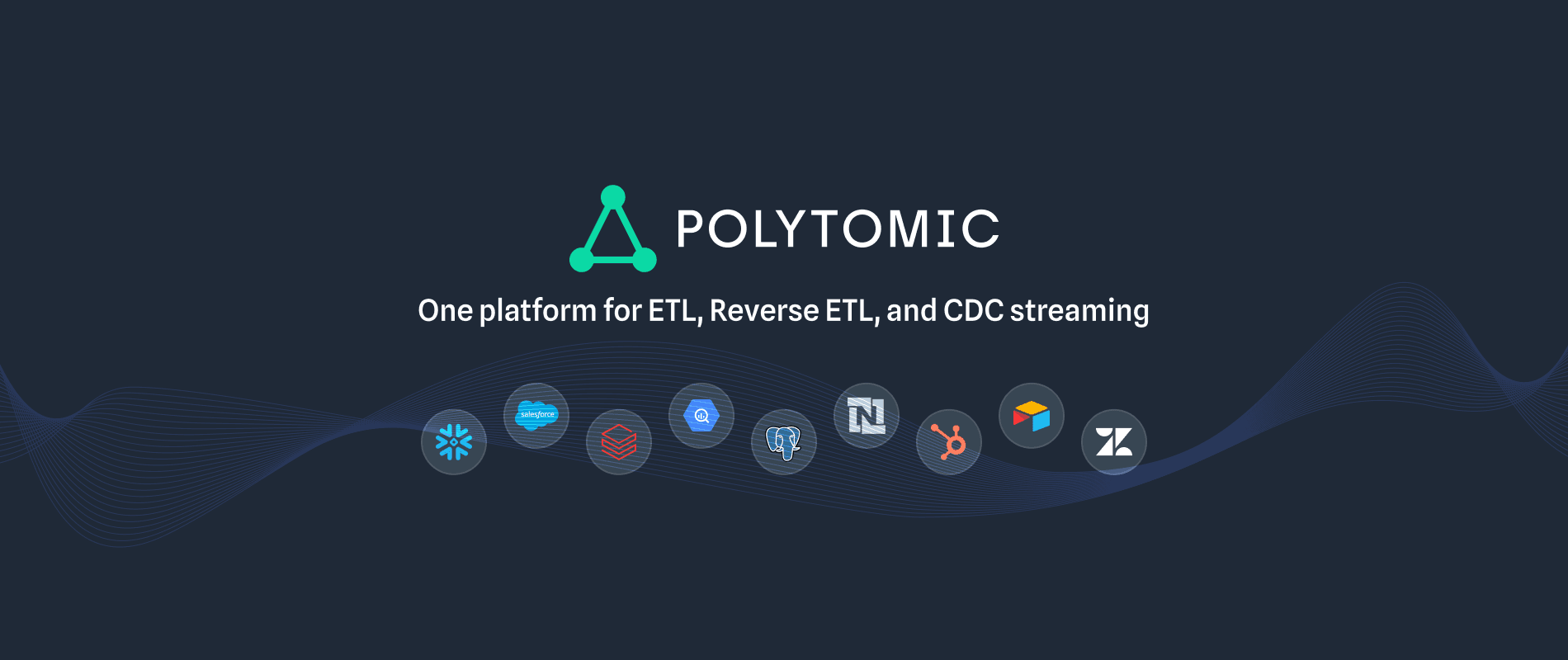Top 6 Hightouch Alternatives & Competitors
Hightouch is a reverse ETL and AI platform designed for marketing and personalization, enabling companies to find insights, run campaigns, and build AI agents using their data.

What is Hightouch?

Hightouch
Hightouch is a reverse ETL and AI platform tailored for marketing and personalization, empowering businesses to extract insights, execute campaigns, and develop AI-driven agents using their data. It features an AI Decisioning Platform for lifecycle marketing and a Composable Customer Data Platform (CDP) that is adaptable, secure, and rapidly deployable, all built on top of a data warehouse.

Key Features
- Sync data with Reverse ETL
- Emphasis on AI features and marketing personalization
- Free tier to get started
Limitations
- Does not support syncing to data warehouses (No ETL)
- Excess features and pricing for just Reverse ETL
- Lack of unlimited workspaces
Pricing
Hightouch provides a Starter Plan that includes a free tier at no cost and a paid tier priced at $350 per month, billed annually with a 20% discount. For larger organizations, the Business Plan offers custom pricing designed to meet specific requirements, featuring unlimited user seats and advanced personalization options.
Why Consider Hightouch Alternatives
While Hightouch is a well-known player in the data integration space, it has its limitations that prompt users to seek alternatives. Here are some reasons why companies consider other options:
- Does Not Support Syncing to Data Warehouses: Hightouch focuses on Reverse ETL, which means it doesn't support moving data into your data warehouse. This limitation forces users to rely on additional tools for ETL processes.
- Excess Features and Pricing for Just Reverse ETL: Hightouch offers a range of features, but if your primary need is Reverse ETL, you might find yourself paying for functionalities you don't use. This can make it an expensive choice for specific use cases.
- Lack of Unlimited Workspaces: Hightouch does not offer unlimited workspaces, which can be a significant drawback for organizations with multiple teams or departments. This limitation can lead to increased complexity in managing data access and workflows.
Below is a table breaking down six alternatives to Hightouch and their tradeoffs.
Feature-by-Feature Breakdown: Alternatives & Competitors
































































































Top 6 Hightouch Alternatives & Competitors
Polytomic
Data teams appreciate our single ETL platform with unified monitoring to centralize all data movement. We have full SQL support and first-class support for infrastructure-as-code.
RevOps and marketing teams use our no-code UI to quickly and independently set up syncs for product data to their CRM and ad platforms.
Built for enterprise scale, Polytomic can be self-hosted, handles billions of rows reliably, and has multi-tenant workspaces with fine-grained access controls.

All the features you need, on the platform that does it all
Replace multiple vendors
Reduce costs and simplify workflows
One platform for all syncs
ETL, Reverse ETL, CDC, iPaaS, APIs, and spreadsheets
Sync only what's changed
Save on API limits and compute costs
Point and click
Select and filter your data without writing code
SQL query support
Powerful transformations when you need them
Pull from any API
No more glue code for custom integrations
Self-hosting available
Turnkey deployment to your private cloud
Enterprise-ready
SOC 2, GDPR, permissions, and audit logs
Integrated with your favorite tools
Sync any of your proprietary data from databases, data warehouses, and spreadsheets to the business systems you use.








Pricing begins at $500/month
Standard
Everything in Basic, plus:
- Sync to and from databases, warehouses, spreadsheets, apps, and APIs
- Unlimited users and connections
- Multiple sync destinations
- Live chat support with engineers
Enterprise
Everything in Standard, plus:
- On-prem deployment
- Single sign-on (SSO)
- Dedicated engineer
- Phone support

Stitch Data
Stitch Data offers a cloud-based ETL solution that allows users to transfer data from more than 140 sources into a data warehouse with ease, requiring minimal technical know-how. In 2018, the company was acquired by Qlik, a legacy data provider, and subsequently integrated with Talend to enhance its data integration capabilities.

Key Features
- Move data from sources to data warehouse (ETL)
- No coding required
- SOC2 certified
Limitations
- Bugs and instability at scale
- Slow to update to connector API changes
- No Reverse ETL
- Lack of growth for new connector support
Pricing
Stitch Data provides three distinct pricing tiers to accommodate various user requirements and data capacities. The Standard Plan begins at $100 per month, offering essential features for smaller operations. For more advanced needs, the Advanced Plan is available at $1,250 per month when billed annually. This plan includes enhanced capabilities suitable for growing businesses.
At the top end, the Premium Plan costs $2,500 per month, also billed annually, and is tailored for enterprises with extensive data needs. Each plan scales its features to match the complexity and volume of data handled by the user.

Census
Census is a Reverse ETL tool designed to transfer data from your data warehouse to various SaaS applications, including Salesforce, Hubspot, and advertising platforms. This enables businesses to leverage their data more effectively by ensuring that critical information is consistently updated across all operational tools.

Key Features
- Sync from data warehouse to tools (Reverse ETL)
- Workspaces
- White-label API
Limitations
- Limited number of synced fields for Professional plan
- Pricing model not based on scale (per field pricing)
- Enterprise plan needed for syncs more frequent than 15 minutes
- Inability to sync to data warehouses (No ETL/ELT)
Pricing
Census offers three main pricing plans: the limited free plan, a Professional plan starting at $350/month, and custom Enterprise plans. The Enterprise plan is required for real-time sync capabilities and their “Audience Hub” features.

Fivetran
Fivetran is a widely-used ETL solution designed to transfer data from various sources such as SaaS applications, databases, and files into data warehouses including Snowflake, BigQuery, Databricks, and Redshift. It automates the data integration process, ensuring that data is consistently and accurately moved to the desired destination, enabling businesses to focus on analysis rather than data pipeline maintenance.

Key Features
- Widely-known ETL vendor
- Large number of built-in connectors
- Plug-and-play syncing into data warehouses
- Simple to use for smaller businesses
Limitations
- Unable to sync back into SaaS applications (no Reverse ETL)
- Frequent price increases
- High cost at medium scale and beyond
- Limited and unreliable customer support
- Slow response to new connector requests
Pricing
Fivetran provides several pricing tiers to accommodate different needs. Their Free Plan is available at no cost, while the Standard Plan is priced at $500 per million monthly active rows (MAR). For more extensive requirements, the Enterprise Plan costs $667 per million MAR, and the Business Critical Plan is set at $1,067 per million MAR. As of March 2025, Fivetran's bulk sync discounts are applied on a per connector basis rather than across the entire workspace, which has led to higher costs for many users.

Airbyte
Airbyte is a versatile open-source data integration platform aimed at centralizing data across warehouses, lakes, and databases. It provides various options such as Airbyte Cloud for rapid deployment, Airbyte Self-Managed Enterprise for robust data security, and Airbyte Open Source, trusted by more than 40,000 organizations. This flexibility makes it a go-to solution for diverse data integration needs.

Key Features
- Transfer data from various systems to data warehouses (ETL)
- Extensive range of built-in connectors
- Self-service capabilities
- Vibrant open-source community
Limitations
- Many connectors are only “community-supported”
- Complicated setup procedures
- Fragile and underdeveloped at scale
- Incapable of transferring data from warehouses to SaaS applications (No Reverse ETL)
Pricing
Airbyte provides several pricing tiers to cater to different needs. Their offerings include a free Open Source plan for those who prefer self-hosting, a Cloud plan that charges based on data volume, and Team and Enterprise plans that are capacity-based. Each plan differs in hosting options, sync frequency, and additional features. The Cloud plan may incur additional costs for more frequent syncs, while the Team and Enterprise plans come with various add-ons to enhance functionality.

Hevo Data
Hevo Data is a no-code platform designed for ETL processes, enabling users to seamlessly extract, transform, and load data from more than 150 different sources. This tool simplifies data integration, making it accessible for users without technical expertise to manage complex data workflows efficiently.

Key Features
- ETL data integration for syncing to data warehouses
- Works well at sub 5 million rows/month
- 150+ data sources
- Free tier available at small scale
Limitations
- Issues with scalability even at 5 million rows/month
- Slow support (even the Enterprise plan only offers 1hr support SLA)
- Unreliable for critical infrastructure
- No Reverse ETL offered
Pricing
Hevo Data’s pricing structure is well-suited for companies with modest data requirements. They provide a generous free tier that allows up to 1 million events to be synced each month. For those needing more, their starter plan ranges from $299 to $949 per month, accommodating between 5 and 50 million monthly synced events. Additionally, Hevo offers Professional and Business Critical plans that come with enhanced features for more demanding data needs.
Why customers are switching to Polytomic
Polytomic unifies ETL/ELT, Reverse ETL, and database CDC into a single platform—so your data moves in and out of the data warehouse without relying on multiple vendors.
- Built for Data Teams: Consolidate your ETL and Reverse ETL needs with one solution. Polytomic handles high-throughput CDC streaming, full SQL transformations, and support for infrastructure-as-code.
- RevOps and Marketing-Friendly: Launch data pipelines to your CRM and ad platforms in minutes with an intuitive UI, plus advanced tools like live SOQL transformations on Salesforce data.
- API for AI & Product Teams: Deliver embedded customer integrations via our white-labeled native API. Polytomic supports seamless syncing into customer CRMs and data warehouses with built-in auth and integrations with the whole GTM stack.
- Enterprise-Grade: Deploy on-prem or in the cloud, manage complex orgs with multi-tenant workspaces and fine-grained RBAC permissions, and cut costs by 30–50% through platform consolidation. Backed by fast, responsive support from real data engineers.
Get hands-on with Polytomic
See how easy it is to sync data to the tools your team actually uses—no code, no waiting.
